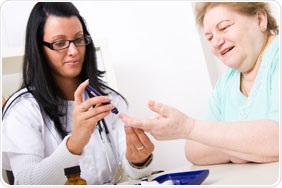Cases of diabetes and pre-diabetes in the United States have nearly doubled since 1988, suggests new research from the Johns Hopkins Bloomberg School of Public Health, with obesity apparently to blame for the surge. The researchers also found that the burden of the disease has not hit all groups equally, with alarming increases in diabetes in blacks, Hispanics and the elderly.

According to new research reported in the April 15, 2014 issue of the Annals of Internal Medicine, diabetes increased from 6 percent to 10 percent in the past two decades and pre-diabetes also doubled in prevalence over the same period. Depending on the definition used, current estimates of the prevalence of pre-diabetes range from 12 percent to 30 percent in the population. "There is a growing need to recognize this serious issue, especially since most cases of diabetes can be prevented through weight loss and other lifestyle changes," said lead author, Elizabeth Selvin, PhD, MPH, an Associate Professor at the Johns Hopkins Bloomberg School of Public Health.
In 2010, approximately 21 million American adults aged 20 or older had confirmed diabetes (either diagnosed or undiagnosed). The investigators analyzed data from more than 43,000 participants collected over two decades in the National Health and Nutrition Examination Surveys (NHANES). Selvin and her fellow investigators set out to update national trends in pre-diabetes, diabetes and its treatment based on data from the NHANES.
One novel aspect of this study was to "confirm" cases of undiagnosed diabetes in the population. Previous studies of diabetes prevalence have relied on single tests of glucose to identify undiagnosed cases of diabetes in the population. But in reality, glucose tests would be confirmed by a second test in the doctor's office. The investigators used a second measure, HbA1c, a lab test that measures glucose over the past three months, to confirm all cases of undiagnosed diabetes in their study to give the most realistic estimate of the burden of the condition in the population.
While diabetes has increased dramatically in the population, the investigators found that the proportion of cases of diabetes that are undiagnosed has decreased. Currently, only 11% of diabetes cases in the U.S. population are undiagnosed, suggesting major improvements in screening and diagnosis of diabetes during the last two decades.
However, major challenges still exist despite improvements in screening and treatment for diabetes. The investigators found a greater prevalence of pre-diabetes and diabetes, particularly undiagnosed diabetes, in ethnic minorities compared with whites. This disparity has increased over the past 20 years. "The substantially greater prevalence of pre-diabetes and diabetes, and poor rates of glycemic control (even among persons with medication-treated diabetes) in ethnic minority populations is particularly concerning," Selvin said. "Especially since blacks and Mexican Americans are also at a greater risk for complications of diabetes."
Total diabetes in blacks was nearly double the prevalence in whites (15% vs. 9%). Mexican Americans also had a greater prevalence of diabetes than whites (12% vs. 9%). Racial and ethnic differences also existed in treatment of diabetes and glycemic control. Among persons diagnosed with diabetes who reported currently taking medications, only 52% of non-Hispanic blacks and 43% of Mexican Americans had HbA1c levels less than 7.0% compared with 57% of non-Hispanic whites.
"The implications of the increase in pre-diabetes and diabetes are enormous but the good news is we are doing better with screening and diagnosis," says Selvin.